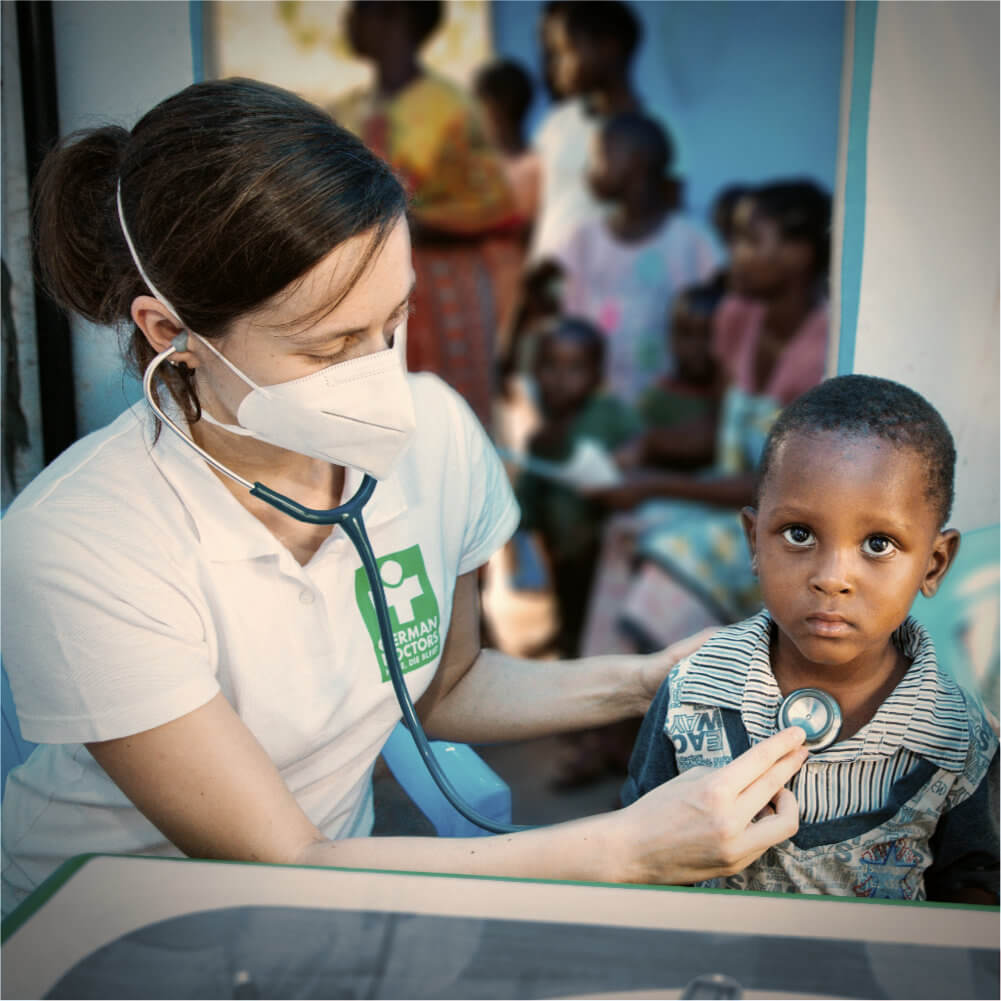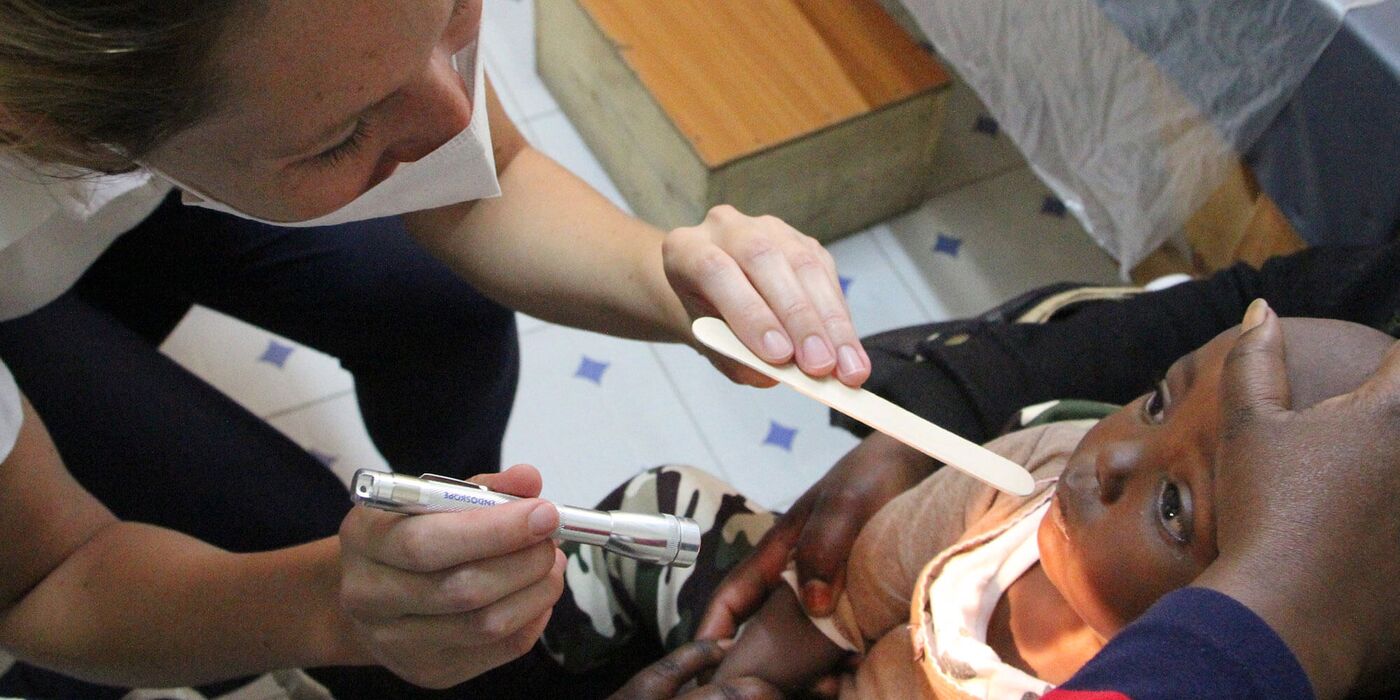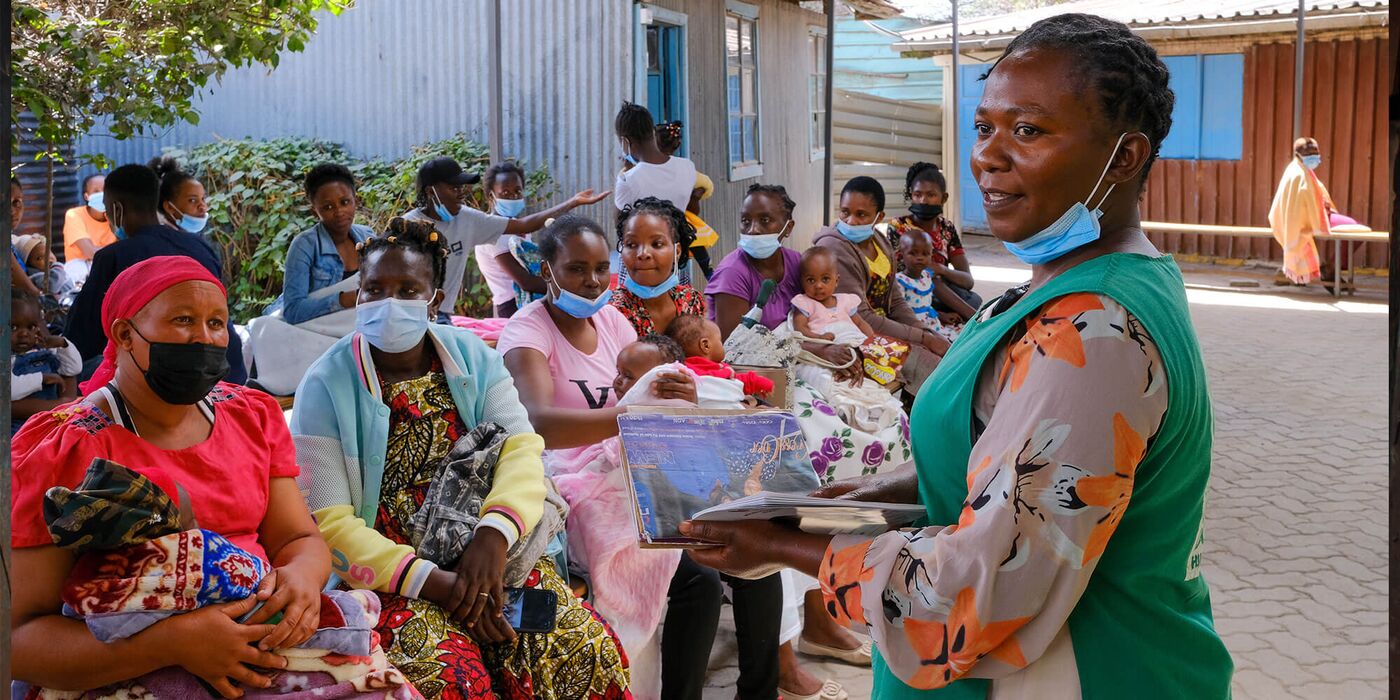The Athi River project
Survey
Where clean water is a luxury
The city of Athi River is located south of Nairobi, about 1.5 hours’ drive from our outpatient clinic ‘Baraka’. 70,000 people, mainly young families, live in the slums surrounding our project. Electricity, a sewage system, refrigerators, sanitary utilities, all things we take for granted, are either non-existent or only partially available in the corrugated-iron huts along the Athi River. Access to clean water is one of the greatest problems for the residents there. Since water is not freely available, 20-liter containers are delivered in vans and can be purchased for 50 Kenia schillings. For the many individuals who live on the scant income of day laborers, this represents a huge financial burden. As many people in Athi River repeatedly use dirty water due to the above-described difficulties, they are often ill.
Fanaka Medical Center – outpatient clinic in the slum
When we set up the new outpatient clinic, Fanaka Medical Center, we profited from our yearlong experience with the outpatient clinic ‘Baraka’ in Nairobi and close cooperation with the local staff. We are proud that the management of the Baraka Health Center built up the new project largely on their own. This confirms that our aid has the potential to improve medical structures in the long term throughout Kenia by strengthening the capacities of the medical personnel. The outpatient clinic offers needy individuals in the surrounding slums the urgently required basic medical care. Aside from private hospitals, whose fees far exceed the financial means of the slum dwellers, there is hardly any access to healthcare services nearby. We also want to support the many HIV-positive patients and those with AIDS. All patients are routinely tested for HIV. Our local staff also offer counselling for the important topic of family planning.






Prevention and protection for families
A striking number of young families live in the Athi-River slums. Mothers play a central role in the health of family members, so we concentrate our efforts, aside from children and youths, above all on young mothers. By means of sex education and physical examinations at close intervals we can, for example, contribute to safe pregnancy and help reduce child mortality. As in all our projects, we concentrate on education and counselling to improve the life situations of people on site and in the long term. Our team also uses the outpatient waiting periods to familiarize the patients with important topics in healthcare. These range from safe drinking water and handwashing to HIV prevention and counselling in cases of sexual abuse and domestic violence.
Like in the Baraka Health Clinic in the Mathare Valley slum, we also train community health workers (CHWs). They are regularly underway in the slum, make home visits, and are in close communication with those in need.
Where clean water is a luxury
The city of Athi River is located south of Nairobi, about 1.5 hours’ drive from our outpatient clinic ‘Baraka’. 70,000 people, mainly young families, live in the slums surrounding our project. Electricity, a sewage system, refrigerators, sanitary utilities, all things we take for granted, are either non-existent or only partially available in the corrugated-iron huts along the Athi River. Access to clean water is one of the greatest problems for the residents there. Since water is not freely available, 20-liter containers are delivered in vans and can be purchased for 50 Kenia schillings. For the many individuals who live on the scant income of day laborers, this represents a huge financial burden. As many people in Athi River repeatedly use dirty water due to the above-described difficulties, they are often ill.
Fanaka Medical Center – outpatient clinic in the slum
When we set up the new outpatient clinic, Fanaka Medical Center, we profited from our yearlong experience with the outpatient clinic ‘Baraka’ in Nairobi and close cooperation with the local staff. We are proud that the management of the Baraka Health Center built up the new project largely on their own. This confirms that our aid has the potential to improve medical structures in the long term throughout Kenia by strengthening the capacities of the medical personnel. The outpatient clinic offers needy individuals in the surrounding slums the urgently required basic medical care. Aside from private hospitals, whose fees far exceed the financial means of the slum dwellers, there is hardly any access to healthcare services nearby. We also want to support the many HIV-positive patients and those with AIDS. All patients are routinely tested for HIV. Our local staff also offer counselling for the important topic of family planning.
Prevention and protection for families
A striking number of young families live in the Athi-River slums. Mothers play a central role in the health of family members, so we concentrate our efforts, aside from children and youths, above all on young mothers. By means of sex education and physical examinations at close intervals we can, for example, contribute to safe pregnancy and help reduce child mortality. As in all our projects, we concentrate on education and counselling to improve the life situations of people on site and in the long term. Our team also uses the outpatient waiting periods to familiarize the patients with important topics in healthcare. These range from safe drinking water and handwashing to HIV prevention and counselling in cases of sexual abuse and domestic violence.
Like in the Baraka Health Clinic in the Mathare Valley slum, we also train community health workers (CHWs). They are regularly underway in the slum, make home visits, and are in close communication with those in need.
Dates and Facts
Project begin: 2020
Number of doctors: Two German doctors present at all times.
Missions: 43 volunteer outreaches since project inception.
Patient contacts: Around 30,000 treatments are performed annually in Athi River.
Partner: We work closely with the outpatient clinic, Baraka, in Nairobi and cooperate with the neighboring hospitals.



Structure: The local staff and German doctors work in a permanent outpatient clinic in Athi River, the Fanaka Medical Center. Community health workers (CHWs) also perform social work in the slums.
Mission site: These include three slums surrounding the Fanaka Medical Center. We estimate that we can reach about 70,000 people with our services.
Most common health problems: We assume that, aside from the high incidence of HIV, many diseases, like diarrhoea and gastrointestinal illnesses, are caused by the problematic water situation.
Priorities: Besides general medical treatment, we emphasize HIV testing, advice about family planning, and disease prevention.
Project begin: 2020
Number of doctors: Two German doctors present at all times.
Missions: 43 volunteer outreaches since project inception.
Patient contacts: Around 30,000 treatments are performed annually in Athi River.
Partner: We work closely with the outpatient clinic, Baraka, in Nairobi and cooperate with the neighboring hospitals.
Structure: The local staff and German doctors work in a permanent outpatient clinic in Athi River, the Fanaka Medical Center. Community health workers (CHWs) also perform social work in the slums.
Mission site: These include three slums surrounding the Fanaka Medical Center. We estimate that we can reach about 70,000 people with our services.
Most common health problems: We assume that, aside from the high incidence of HIV, many diseases, like diarrhoea and gastrointestinal illnesses, are caused by the problematic water situation.
Priorities: Besides general medical treatment, we emphasize HIV testing, advice about family planning, and disease prevention.
Ambulance
Basic medical care in the slum
The situation analysis which we performed before starting the project demonstrated the urgency of basic medical care for the marginalized social class of Athi River. Fewer than 30% of the residents have health insurance, private medical facilities exceed their financial means, and there are repeated shortages of medication in the closest state medical facility. Our emphasis is the provision of basic medical care; we work closely with the state hospitals to which we refer patients when necessary. As in our outpatient facility, the Baraka Health Center in Nairobi, the Fanaka Medical Center has several treatment rooms with different priorities. To keep the waiting times as short as possible, all patients are selected by triage at the entrance and referred to the laboratory, the pharmacy, or the doctors.


Help for patients with HIV/Aids
As almost everywhere in Africa, the high incidence of HIV is an urgent problem. The area around Athi River is especially heavily affected: 3.2% of the 70,000 persons within our target area have HIV, which amounts to about 2,250 individuals. Especially the rate of mother-to-child transmission of HIV is considerably higher than the national average (study by the Ministry of Health in 2014). The number of tuberculosis cases in the region has also increased during the past years. Therefore, our first step will be to perform as many HIV tests as possible and to educate the patients. Only those who know they are infected can behave appropriately and protect others.
Training program in Athi River
Out motto, ‘long-term aid’, is best achieved when we invest in medical training. We have already achieved this in Nairobi, as the clinical officers (COs) have become well trained, thanks to support by the German Doctors, among others. They can now treat patients with chronic illnesses independently. The Athi-River staff will also receive training in ultrasound diagnostics and HIV, as well as general medical training, so that they can increasingly provide basic medical care for our target population.
Basic medical care in the slum
The situation analysis which we performed before starting the project demonstrated the urgency of basic medical care for the marginalized social class of Athi River. Fewer than 30% of the residents have health insurance, private medical facilities exceed their financial means, and there are repeated shortages of medication in the closest state medical facility. Our emphasis is the provision of basic medical care; we work closely with the state hospitals to which we refer patients when necessary. As in our outpatient facility, the Baraka Health Center in Nairobi, the Fanaka Medical Center has several treatment rooms with different priorities. To keep the waiting times as short as possible, all patients are selected by triage at the entrance and referred to the laboratory, the pharmacy, or the doctors.
Help for patients with HIV/Aids
As almost everywhere in Africa, the high incidence of HIV is an urgent problem. The area around Athi River is especially heavily affected: 3.2% of the 70,000 persons within our target area have HIV, which amounts to about 2,250 individuals. Especially the rate of mother-to-child transmission of HIV is considerably higher than the national average (study by the Ministry of Health in 2014). The number of tuberculosis cases in the region has also increased during the past years. Therefore, our first step will be to perform as many HIV tests as possible and to educate the patients. Only those who know they are infected can behave appropriately and protect others.
Training program in Athi River
Out motto, ‘long-term aid’, is best achieved when we invest in medical training. We have already achieved this in Nairobi, as the clinical officers (COs) have become well trained, thanks to support by the German Doctors, among others. They can now treat patients with chronic illnesses independently. The Athi-River staff will also receive training in ultrasound diagnostics and HIV, as well as general medical training, so that they can increasingly provide basic medical care for our target population.
Living Conditions
Daily life without any perspectives
The city of Athi River is located south of Nairobi in Machakos county in Kenia. The city is named after the Athi River, which runs through it. The city is growing very rapidly due to its proximity to Nairobi and industrialization, e.g. mining and oil and steel production. However, very few people have well-paid jobs; many of the approximately 70,000 people who live in the slums surrounding our project work as poorly-paid day laborers in the factories, on construction sites, or as maids. Many have given up all hope of escaping the poverty prevailing in the slums, as their scant income scarcely provides the means to feed their families.




The residents build their houses provisionally out of corrugated-iron sheets and adobe. Whoever has a refrigerator and electricity can consider him-/herself fortunate. There is no sewage system, and the sanitary situation is inadequate. Above all, the provision of water is problematic; potable water in not available for free in the slum. Vans provide the slums with 20-liter canisters, which must be bought. As a result, the residents do not always use clean water, which repeatedly causes health problems.
Daily life without any perspectives
The city of Athi River is located south of Nairobi in Machakos county in Kenia. The city is named after the Athi River, which runs through it. The city is growing very rapidly due to its proximity to Nairobi and industrialization, e.g. mining and oil and steel production. However, very few people have well-paid jobs; many of the approximately 70,000 people who live in the slums surrounding our project work as poorly-paid day laborers in the factories, on construction sites, or as maids. Many have given up all hope of escaping the poverty prevailing in the slums, as their scant income scarcely provides the means to feed their families.
The residents build their houses provisionally out of corrugated-iron sheets and adobe. Whoever has a refrigerator and electricity can consider him-/herself fortunate. There is no sewage system, and the sanitary situation is inadequate. Above all, the provision of water is problematic; potable water in not available for free in the slum. Vans provide the slums with 20-liter canisters, which must be bought. As a result, the residents do not always use clean water, which repeatedly causes health problems.



















